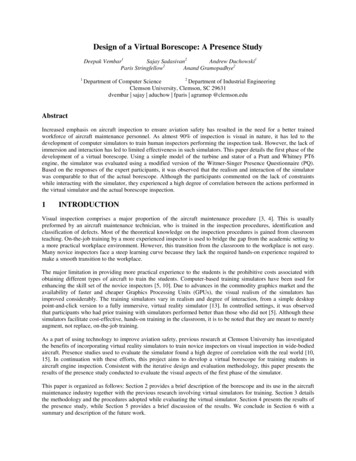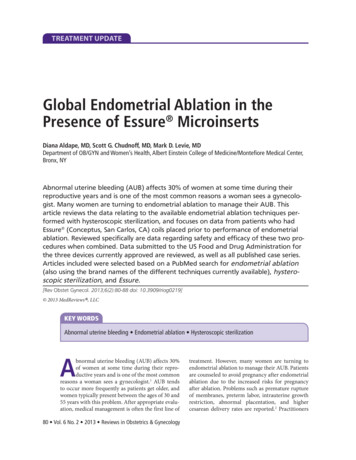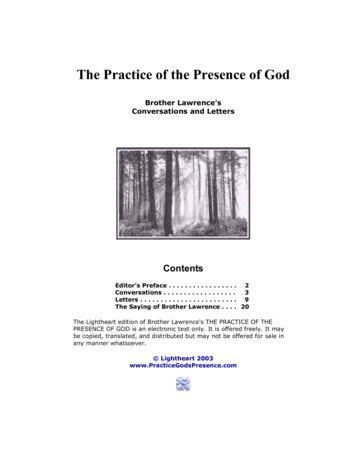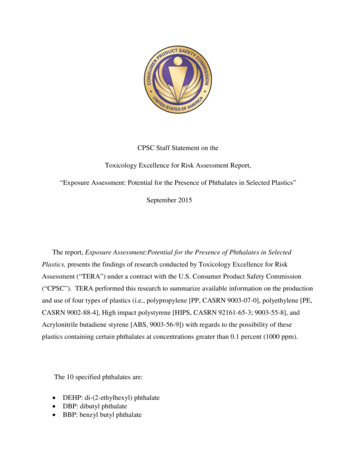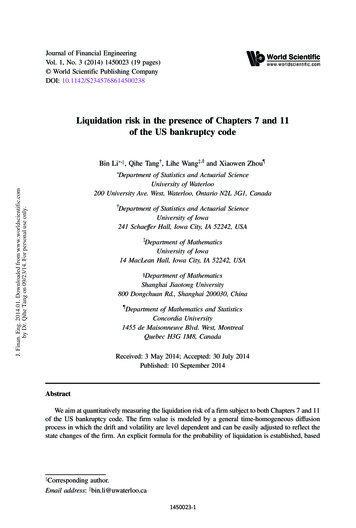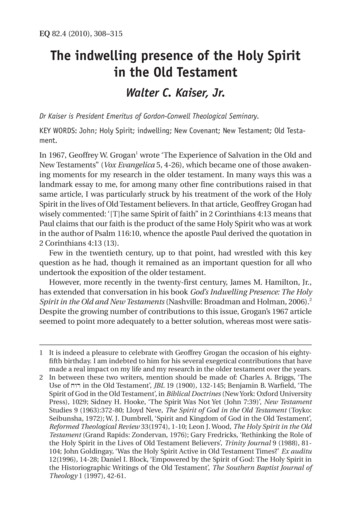
Transcription
EQ 82.4 (2010), 308–315The indwelling presence of the Holy Spiritin the Old TestamentWalter C. Kaiser, Jr.Dr Kaiser is President Emeritus of Gordon-Conwell Theological Seminary.KEY WORDS: John; Holy Spirit; indwelling; New Covenant; New Testament; Old Testament.In 1967, Geoffrey W. Grogan1 wrote ‘The Experience of Salvation in the Old andNew Testaments” (Vox Evangelica 5, 4-26), which became one of those awakening moments for my research in the older testament. In many ways this was alandmark essay to me, for among many other fine contributions raised in thatsame article, I was particularly struck by his treatment of the work of the HolySpirit in the lives of Old Testament believers. In that article, Geoffrey Grogan hadwisely commented: ‘[T]he same Spirit of faith” in 2 Corinthians 4:13 means thatPaul claims that our faith is the product of the same Holy Spirit who was at workin the author of Psalm 116:10, whence the apostle Paul derived the quotation in2 Corinthians 4:13 (13).Few in the twentieth century, up to that point, had wrestled with this keyquestion as he had, though it remained as an important question for all whoundertook the exposition of the older testament.However, more recently in the twenty-first century, James M. Hamilton, Jr.,has extended that conversation in his book God’s Indwelling Presence: The HolySpirit in the Old and New Testaments (Nashville: Broadman and Holman, 2006).2Despite the growing number of contributions to this issue, Grogan’s 1967 articleseemed to point more adequately to a better solution, whereas most were satis-1 It is indeed a pleasure to celebrate with Geoffrey Grogan the occasion of his eightyfifth birthday. I am indebted to him for his several exegetical contributions that havemade a real impact on my life and my research in the older testament over the years.2 In between these two writers, mention should be made of: Charles A. Briggs, ‘TheUse of xwr in the Old Testament’, JBL 19 (1900), 132-145; Benjamin B. Warfield, ‘TheSpirit of God in the Old Testament’, in Biblical Doctrines (New York: Oxford UniversityPress), 1029; Sidney H. Hooke, ‘The Spirit Was Not Yet (John 7:39)’, New TestamentStudies 9 (1963):372-80; Lloyd Neve, The Spirit of God in the Old Testament (Toyko:Seibunsha, 1972); W. J. Dumbrell, ‘Spirit and Kingdom of God in the Old Testament’,Reformed Theological Review 33(1974), 1-10; Leon J. Wood, The Holy Spirit in the OldTestament (Grand Rapids: Zondervan, 1976); Gary Fredricks, ‘Rethinking the Role ofthe Holy Spirit in the Lives of Old Testament Believers’, Trinity Journal 9 (1988), 81104; John Goldingay, ‘Was the Holy Spirit Active in Old Testament Times?’ Ex auditu12(1996), 14-28; Daniel I. Block, ‘Empowered by the Spirit of God: The Holy Spirit inthe Historiographic Writings of the Old Testament’, The Southern Baptist Journal ofTheology 1 (1997), 42-61.
The indwelling presence of the Holy Spirit in the Old Testament EQ 309fied to reserve the special experience of the indwelling of the Holy Spirit in thebeliever until New Testament times, as Hamilton also went on to argue.To be sure, there was general agreement on the Spirit’s work in an individual’sregeneration, for the incident of Nicodemus in John’s gospel, chapter 3, seemedto easily secure that conclusion, especially since it took place in a time beforethe death, burial and resurrection of Messiah. Where the agreement stopped,however, was over the question as to whether the Old Testament believer had anabiding experience of the Holy Spirit’s presence in the believer’s life. The mostthat many would allow was that the Holy Spirit would come upon special individuals for special times, such as the seventy elders (Num 11:24-30), or on thewriting prophets of the Old Testament for their work in Scripture.However, this conclusion immediately raises an objection: How could all ofthese old covenant persons have believed and been enabled to live sanctifiedlives if the Spirit of God did not dwell in them? Must we say that an Old Testamentbeliever was able to please God spiritually and to be sanctified in the presenceof God without the indwelling presence of the Holy Spirit? Did not Enoch pleaseGod (Heb 11:5)? Was not Noah one who walked with God and who was righteousand blameless (Gen 6:9)? Did not Joseph resist temptation (Gen 39:9)? Was notJob one who turned away from evil, one who feared God and was blameless andupright (Job 1:1)? Did not David pray, do not ‘take your Holy Spirit from me?’ (Ps51:11). Did not the prophet Isaiah teach that the people ‘rebelled and grieved hisHoly Spirit’ (Isa 63:10), the same Lord who had ‘set his Holy Spirit among them?’(Isa 63:11). Moreover, when the Lord chose Bezalel to be the chief craftsman onthe tabernacle, did he not ‘fill him with the Spirit of God’ (Ex 31:3; 35:31). Wasnot John the Baptist ‘filled with the Holy Spirit even from birth’ (which was alsoduring Old Testament times, Lk 1:15), just as Elizabeth was ‘filled with the HolySpirit’ (Lk 1:41). Likewise, John the Baptist’s father Zechariah was ‘filled with theHoly Spirit and [he] prophesied’ (Lk 1:67).But on the other hand, if they were indwelt, then what are we to make of John7:39 and 16:7? These two texts would appear to contradict the claims just citedfrom the Old Testament.Defining the indwelling presence of the Holy SpiritThe indwelling presence of the Holy Spirit is defined as the abiding and on-going work of the Holy Spirit of God, in which he resides within the believer to blessor to judge each, as determined by the standard of God’s covenant and will. Thisis to be distinguished from God’s omnipresence and his work in the physicalrealms, or even in his occasional presence when he was ‘with’ one such as Ishmael (Gen 21:20), which does not carry the full benefits of his presence as it did,for example, with Isaac (Gen 26:3), the person of promise.Once again we must ask: If the regenerating work of the Holy Spirit enabledOld Testament persons to believe, as most appear to readily agree, how werethese old covenant saints maintained and established in their faith if they werenot indwelt by God’s Spirit? Does not Scripture teach that it is the work of the
310 EQWalter C. Kaiser, Jr.Holy Spirit that frees us from the power of sin (Rom 8:1-17)? Did not the apostlePaul emphasize that same power in Galatians 5:16-25? If so, how then were menlike Enoch, Noah, Joseph and Job able to live righteous lives? The requirementfor righteousness is just as strong in the Old Testament as it is in the New Testament, for the apostle Peter quoted from Leviticus 11:44 in 1 Peter 1:15-16 toprove that we should be as holy as the Lord is. There is nothing in Scripture thatsuggests that New Testament believers were enabled to live on a higher plane orto experience holiness and righteousness more than their Old Testament counterparts.The answer that many give is that the sustaining power of the Holy Spirit inthe lives of these old covenant individuals was to be found in the fact that Godhimself dwelt in the tabernacle and then in the temple.3 This linkage is madeusually because believers in the New Testament are said to be the temple anddwelling place of God (1 Cor 3:16). But will that suffice as an answer to this problem, even if it is assumed that the locale of God’s presence was formerly limitedto the place of worship in the Old Testament, but it is now universal in the livesof all who believe? We do not think it will suffice. Attention must be given to thequestion: how many new things appear in the ‘New Covenant’ and will that covenant supersede the older Abrahamic-Davidic Covenant? It is to that covenant,then, that attention must be given.What is new in the New Covenant?Some complain that if old covenant believers are individually regenerated andindwelt by the Holy Spirit, then what is so ‘new’ about the promised interiorityof the New Covenant in Jeremiah 31:31-34? Why call this promised word in Jeremiah something that was ‘new’?First of all, notice that the majority of the substance of the ‘New Covenant’ isalready found in the Abrahamic-Davidic covenant. For example, the items of itscontinuity include: (1) the same covenant-making God, (2) the same law’/Torah,(3) the same divine fellowship (‘I will be their God’), (4) the same ‘seed’ or people (‘They shall be my people’) and (5) the same forgiveness (‘I will forgive theirwickedness’). Many of the features of the New Covenant’s inwardness, fellowship, individualism, and forgiveness had already been expressed in the earlierform of this same covenant in Deuteronomy 6:6-7; 10:12; 30:6; Psalm 37:31 and40:8. But the question still persists: why call this a ‘new’ covenant if the majorityof its features have already appeared?The second answer is that the Hebrew word for ‘new’ (hadash) also is usedfor ‘renew,’ thus making it in effect the ‘Renewed Covenant,’ with strong continuity with the Abrahamic-Davidic Covenant. Also, it is only called ‘new’ in Jeremiah 31:31-34, but elsewhere it is known as the ‘everlasting covenant’ in seven3 J. M. Hamilton, Jr., ‘God With Men in the Torah’, WTJ 65 (2003), 113-133.
The indwelling presence of the Holy Spirit in the Old Testament EQ 311passages, in three or four passages it is also called a ‘covenant of peace,’ a ‘newheart’ and a ‘new Spirit,’ or simply just ‘my covenant’ or ‘a covenant.’ Thus inthe progress of revelation, it continued what God had described in the Edenicpromise (Gen 3:15), the ‘Semite Promise’ of God’s ‘dwelling’ in the tents of Shem(Gen 9:27), the Abrahamic Promise (Gen 12:2-3) and the Davidic Promise’ (2Sam 7:16-19) that perpetuated the promise of a ‘Seed,’ the Gospel (see Gen 12:3;2 Sam 7:19 and Gal 3:8).Moreover, that ‘New Covenant’ was not made with the Church, but it wasspecifically made with ‘the house of Israel and the house of Judah!’ (Jer 31:31).Therefore, without the olive tree-roots of the promises made to the patriarchsand the trunk of the olive tree, all of which were made ‘irrevocably’ (Rom 11:29)with Israel, the body of New Testament believers and their Church really floats inthin air and has no history or past, which leaves the story of God’s work throughover three-fourths of his revelation in the Old Testament hanging in mid air andunfinished. Thus, there must to be elements of continuity or else New Testamentbelievers are left unsupported and rootless.Therefore, the argument shifts away from the New Covenant, which does notmention the indwelling work of the Holy Spirit anyway, to two New Testamentpassages in John’s Gospel that are the most difficult for the view that the OldTestament believer was indeed indwelt by the Holy Spirit: John 7:37-39 and John14:16-17.John 7:37-39If anyone is thirsty, let him come to me and drink. Whoever believes in me,as the Scripture has said, streams of living water will flow from within him.By this he meant the Spirit, whom those who believed in him were later toreceive. Up to that time the Spirit had not yet been given, since Jesus hadnot yet been glorified.This text is commonly (or at least traditionally) understood to mean that thepermanent indwelling of the Spirit in all believers did not come until after Pentecost. This has become a central tenet for many who claim that John’s distinctivecontribution was that the Holy Spirit’s work of indwelling could not be expecteduntil after Jesus was glorified. But is the reception spoken of in John 7:39 to beidentified as the granting of the indwelling of the Holy Spirit?First of all, the word ‘given,’ in the phrase ‘the Spirit had not yet been given,’does not appear in the best, earliest, or majority Greek texts. Instead, the Greektext literally (and woodenly) reads: ‘for it was not yet Spirit.’ Of course, this cannot mean that the Holy Spirit had not yet come into existence, for that woulddeny the eternality of the Godhead. While the added word ‘given’ was meant toclarify, actually it ended up suggesting for the most part that the Holy Spirit wasnot ‘given’ before Pentecost. Instead of asserting that the Spirit was absent priorto Pentecost, as the addition of this word ‘given’ suggests, John meant to point tothe new coming age of the Spirit, when the outpouring of the Spirit would comelike streams or rivers of water.
312 EQWalter C. Kaiser, Jr.Pentecost was as necessary an event as was the event of the cross of Christitself. Up to that first Easter Sunday morning, men and women could truly beforgiven, regenerated and made part of the people of God on the promised basisthat Christ would later personally come and retrospectively atone for those sinshe had already forgiven by his death on the cross. If Christ had not given hislife as a ransom on that first Good Friday, and been raised from the dead, thosewho believed in the Old Testament would have believed in vain. They neededthe death and resurrection of the Messiah to complete what they had come toexperience by faith, based on the word of God.In like manner, it was also necessary that the Holy Spirit have a visible, actualcoming in state, just as the Suffering Servant had experienced at Calvary. Therefore, Pentecost was that outward demonstration that all that had been promisedin the Old Testament would be validated on that day. Accordingly, T. Goodwincorrectly commented: ‘[The Holy Spirit] must have a coming in state, in a solemn and visible manner, accompanied with visible effects as Christ had.’4 Thus,what happened at Pentecost was both climactic and effusive – words that conveyed a completion to what had been promised and an abundance of a downpour, as opposed to a previous scarcity in spotty showers here and there.The prophet Joel has also chosen to describe the Spirit’s arrival as a ‘pour[ing]out,’ or a downpour (Joel 2:28), which would easily link up with Jesus’ referenceto ‘streams/rivers of living water in John’s gospel. It is correct, then, to see something dramatically enacted and unique to the ministry of the Holy Spirit as it firstoccurred at Pentecost, Samaria, and Cae
EQ 82.4 (2010), 308–315 1 It is indeed a pleasure to celebrate with Geoffrey Grogan the occasion of his eighty-fifth birthday. I am indebted to him for his several exegetical contributions that have made a real impact on my life and my research in the older testament over the years. 2 In between these two writers, mention should be made of: Charles A. Briggs, ‘The Use of xwr in the Old .
